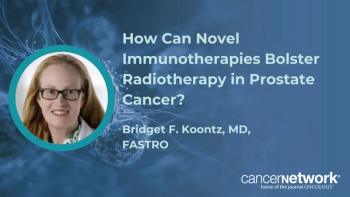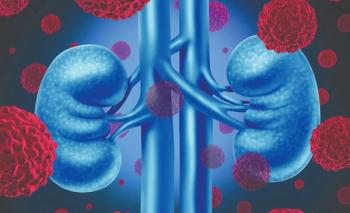
New Tocilizumab Workflow Is More Effective for CRS Related to CAR T, Bispecific Antibodies
A verbal tocilizumab workflow helped provide safer and more effective delivery of the agent for patients experiencing cytokine release syndrome.
A nurse-driven, verbal workflow for placing tocilizumab (Actemra) orders for patients experiencing cytokine release syndrome (CRS) due to bispecific antibody treatment for their lymphoma or multiple myeloma was given efficiently and more timely, according to single-center results presented at the
Of 38 tocilizumab doses ordered, 31 (82%) were given within 1 hour of the order being placed, and when the new workflow was utilized, the majority of nurses administered tocilizumab timelier within 1 hour of the order entry (90.5%). However, tocilizumab administration was less timely when orders were placed by physicians (83.3%) and advanced practice nurses (60.0%). The 1 tocilizumab order placed by a pharmacist was administered within 1 hour of order entry.
“Creating a standardized verbal tocilizumab order workflow provided safe delivery of the drug,” lead study author Andrea Wagner, MSN, RN, OCN, of Hackensack University Medical Center in New Jersey, and coinvestigators wrote in the poster presented during the meeting. “To effectively care for oncology patients, all nurses and members of the interdisciplinary team should be supportive and work together.”
FDA-approved bispecific antibodies with indications in lymphoma and multiple myeloma include2:
- teclistamab-cqyv (Tecvayli) for the treatment of patients with relapsed/refractory multiple myeloma;
- mosunetuzumab-axgb (Lunsumio) for the treatment of patients with relapsed/refractory follicular lymphoma;
- epcoritamab-bysp (Epkinly) for the treatment of patients with relapsed/refractory diffuse large B-cell lymphoma (DLBCL); and
- glofitamab-gxbm (Columvi) for the treatment of patients with relapsed/refractory DLBCL or large B-cell lymphoma
Verbal orders for immunotherapy, targeted therapy, and chemotherapy are not permitted, except for the purpose to hold or stop treatment, according to ONS Chemotherapy and Immunotherapy Guidelines and Recommendations for Practice. While this policy aligns with Hackensack Meridian Health practices, the investigators noted that there is a potential urgent need for tocilizumab to help manage CRS from the use of CAR T-cell therapy and bispecific antibodies.
Investigators, who are from the institution’s lymphoma and multiple myeloma units, examined the potential for developing a nurse-driven workflow, in which the provider would verify tocilizumab’s indication and dosage, while the nurse enters the order into the electronic medical record (EMR). This would theoretically facilitate verbal orders of tocilizumab and help streamline standard processes.
In 2023, the multiple myeloma unit, which comprises 15 private beds, administered its first commercial bispecific antibody after being educated on the new medications, CRS, and accompanying management strategies. For lymphoma, grade 2 or higher CRS events would induce tocilizumab administration, whereas, for those with multiple myeloma, the threshold was grade 1 and higher CRS events to trigger the system to deliver the agent. For both diseases, the provider was given discretion on when to dose tocilizumab for a patient.
In the nurse-driven, verbal order workflow, which was coordinated between both nurses and providers, the procedure was as follows:
- The provider obtained tocilizumab consent on admission;
- A physician communication order listed the indication, patient-specific dose of tocilizumab, and any other pertinent information regarding its use and administration for that individual patient;
- Following the provider’s verbal communication in the CRS setting, the nurse would place the tocilizumab order in the EMR with the use of the physician communication order;
- Tocilizumab would then be administered.
Between March 2023 and March 2024, the 2 units treated a combined 68 patients with bispecific antibodies, with 48 patients having lymphoma (70.6%) and 20 patients having multiple myeloma (29.4%). Thirty-eight doses of tocilizumab were administered, and 21 orders of the drug were placed in the new workflow.
Of the 38 tocilizumab doses, more than half were placed by nurses (55.3%; n = 21), followed by advanced practice nurses (26.3%; n = 10), physicians (15.8%; n = 6), and pharmacists (2.6%; n = 1).
Investigators noted that there were no reported tocilizumab medication errors via the nurse-driven workflow.
Study limitations, they added, include the smaller number of tocilizumab orders using the new workflow.
“In the future, we plan to continue the workflow with the growing bispecific antibody field,” the authors concluded.
References
- Wagner A, Longo M, Sarafin A. Enhancing autonomy: nurse-driven tocilizumab order for treatment of cytokine release syndrome with bispecific antibodies. Presented at: 2024 Oncology Nursing Society Congress; April 24-28, 2024; Washington DC.
- Bispecific antibodies: an area of research and clinical applications. FDA. Last updated February 14, 2024. Accessed April 25, 2024. https://www.fda.gov/drugs/spotlight-cder-science/bispecific-antibodies-area-research-and-clinical-applications
Newsletter
Stay up to date on recent advances in the multidisciplinary approach to cancer.



















































